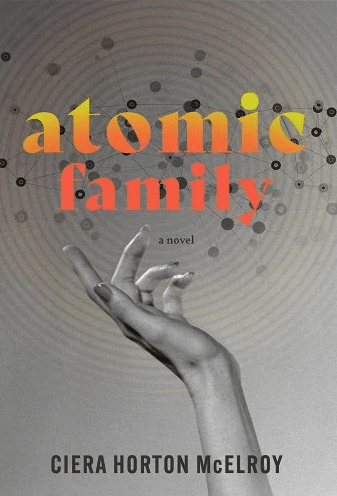Cierra Horton McElroy’s debut novel, Atomic Family, is not an environmental novel of the twenty-first-century, yet its themes of impending nuclear devastation and eco-anxiety nevertheless feel all too real.
Atomic Family is the story of Nellie, Dean, and their son, Wilson, with the novel’s main narrative playing out over a couple of days through these characters’ points of view, though time is more fluid in several omniscient sections as well as government interviews and letters between Dean and Nellie early in their relationship.
It’s the fall of 1961, an era in which everyone lived in fear of the Soviets and their newly tested nuclear bomb, and yet the world was still innocent enough that the adults didn’t know where the kids were after school or on Halloween night; they trusted they’d come home, even if they didn’t trust that the planet would survive.
Dean is an agrologist at the local nuclear plant, and Nellie is “a bomb plant wife” who is “afraid of everything under the sun. Afraid of loneliness, afraid of marriage, afraid of having children, afraid of what she was capable of.” She is also desperately unhappy, keeping bottles of alcohol hidden around the house and in the family fallout shelter, and her “anger is always quick to strike, a match always ready to light.”
Despite their both knowing something is off, the distance between Nellie and Dean only grows wider. As Dean observes, “Theirs is a Cold War marriage—the explosion never happens. Anger hovers in the silence.”
Their son, nine-year-old Wilson, is “his father in miniature. His hair, an earthen brown, cast gold in certain light, recently cut like a bowl. He is thin, wan. He is strange, otherworldly.” Wilson has an active imagination, fueled by fears of the bomb; he and his classmates receive dog tags at school, and they have learned to think about if they grow up, not when. He even dresses as if the bomb will drop at any moment—in “light-colored, loose-fitting clothing … Better to prevent flash burns.”
Yet Wilson is also adventurous; he invites his friends to play in the fallout shelter on Halloween; he loves the street “at dusk, gray-hazed. He loves the magic of seeing into someone’s home” without crawling through hedges or climbing trees. And he’s always on the lookout for Communists. For Wilson, all games are war games.
The day after Halloween, as Nellie joins her fellow “bomb plant” wives and other women in an anti-nuclear protest, Dean is at work composing a report warning of the dangers of nuclear waste in the groundwater, no longer able to stay silent about what he’s learned. “They are not just poisoning people. They are poisoning the earth.”
Dean is haunted by what he’d seen and done in the war, and now, “work and worry follow him home every night.” Despite the era of its setting, the book’s looming tensions feel contemporary: “Terrible days are coming,” Dean reflects one night. Whether nuclear war or the next climate catastrophe, the characters’ stresses are highly relatable. Especially tragic is the stress Wilson and his friends and classmates are growing up with, all-too-relevant to kids today, even if the contexts are different: doing drills at school, wondering what might next fall from the sky.
Cierra Horton McElroy’s research is impressive; Atomic Family captures this era well, from the characters’ overarching anxieties to such details as the uniquity of smoking and ashtrays, women as homemakers who receive allowances from their husbands, people being unreachable in an emergency because they don’t carry phones.
The novel’s turning point is unexpected but powerful. While Dean is interrupted just as he’s about share his report with his manager, Nellie is taking a post-protest trip to a department store in another city, which in turn takes her into the past and into an imagined future, as Dean waits alone in a terrifying present. Despite its focus on the big catastrophes, Atomic Family reminds us that it’s the everyday moments that matter, as the novel shifts from the national and global to the deeply personal.

Midge Raymond is a co-founder of Ashland Creek Press. She is the author of the novels Floreana and My Last Continent, the award-winning short story collection Forgetting English, and, with John Yunker, the suspense novel Devils Island.


